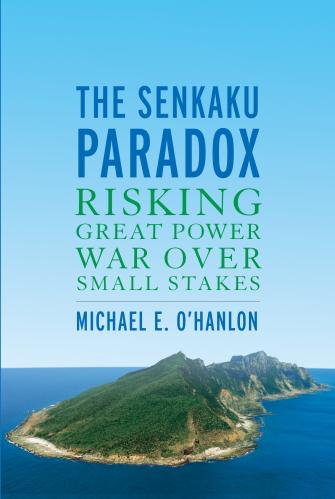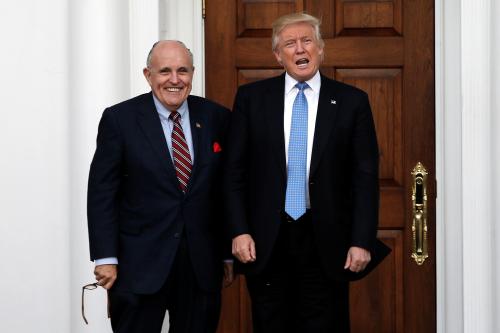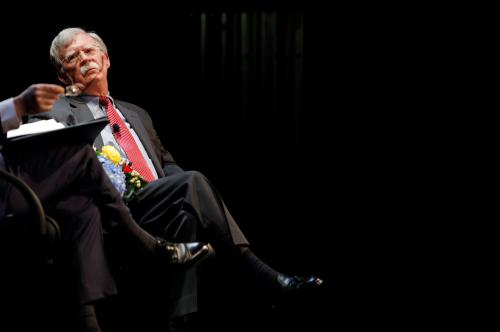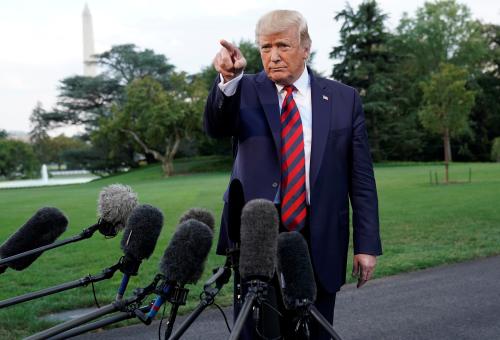President Trump’s impeachment trial in the Senate should put his broader foreign policy on trial, argues Thomas Wright. Left unchecked, the president’s efforts to bend American foreign policy to reflect his personal beliefs and interests could lead to a permanent upending of America’s global role, including the end of the alliance system. This piece originally appeared in The Atlantic.
As the House of Representatives nears a vote on two articles of impeachment, very few people think President Donald Trump’s conduct was “perfect,” as he claims it was. The partisan divide revolves around whether his wrongdoing rises to the level of an impeachable offense. Democrats believe it does, but Republicans overwhelmingly think it does not. Yes, Trump’s behavior may have been “inappropriate and misguided,” argued Will Hurd, a retiring House member from Texas, but “an impeachable offense should be compelling, overwhelmingly clear, and unambiguous.” For the GOP, this standard has not been met.
If this is the question, then the trial in the Senate must move beyond Ukraine. It should put Trump’s foreign policy on trial. The president’s effort to pressure the Ukrainian government is part of a larger pattern of bending American foreign policy to reflect his own personal beliefs and interests. Left unchecked, it could lead to a permanent upending of America’s global role, including the end of the alliance system. A Senate trial is the Republicans’ last, best chance to avert this scenario—because if Trump remains in office once the trial is over, they will be fully committed to ensuring his reelection, no matter what he’s done.
The basic charge from the House, according to the proposed articles of impeachment that House leaders released this morning, is that Trump used foreign policy for his own personal benefit. A related concern is that Trump systematically ignores professional advice to pursue a policy that damages America’s interests—for instance, by basing policy on unfounded conspiracy theories, including the discredited idea that Ukraine, not Russia, interfered in the 2016 U.S. election.
Impeachment is a political process, not just a legal one. The Senate’s responsibility is to assess the president’s fitness for office based on the charges and the evidence against him. The Senate must ask whether the wrongdoing revealed in the Ukraine episode is typical of the president’s approach and will worsen over time or whether it is an isolated incident and Trump is, for the most part, performing his duties as commander in chief responsibly. To put it another way, if the Senate acquits the president, will he see it as a permission slip to indulge in ever more inappropriate behavior, or has he learned his lesson?
These questions cannot be answered by cross-examining the witnesses who already testified in front of the House. They have told us what they know. The facts are clear and not in dispute. They cannot be answered by putting Hunter Biden on the stand. No one seriously believes the president was motivated by a desire to tackle corruption in Kyiv. Trump’s fitness to continue in office can be assessed only by a full audit of his approach to national security—by talking with people who served on his national-security team, including former National Security Adviser H. R. McMaster, former Chief of Staff John Kelly, former Defense Secretary Jim Mattis, and especially former National Security Adviser John Bolton.
This inquiry should not be geared toward embarrassing the president for mistakes made early in his tenure. The Senate must evaluate the trajectory of Trump’s presidency. Have things stabilized or are they getting worse? Is the aid-to-Ukraine scandal a sign of things to come?
Trump’s supporters have recognized that the broader foreign-policy context can affect the Senate’s decision. Writing in National Review at the beginning of the impeachment process, Andrew McCarthy, a former prosecutor who is a staunch defender of the president, wrote that while Trump’s decision to green-light Turkish President Recep Tayyip Erdoğan’s invasion of Kurdish-held areas of Syria “ostensibly …has nothing to do with the impeachment frenzy over Ukraine … Turkey’s aggression could crack the president’s impeachment firewall.” The Republican storm over Syria has passed, but long-term concern remains, expressed in hushed tones.
Bolton, who served as national security adviser under Trump and ambassador to the United Nations under George W. Bush, recently gave a paid speech to a group of Morgan Stanley executives in Miami. He was asked what might happen if Trump is reelected. According to NBC News, which spoke with three attendees, “Bolton said Trump could go full isolationist—with the faction of the Republican Party that aligns with [Senator Rand] Paul’s foreign-policy views taking over the GOP—and could withdraw the U.S. from NATO and other international alliances.”
This is precisely the type of assertion that the Senate must grapple with. Did Bolton have a reasonable basis on which to draw this conclusion—perhaps conversations with the president?
Since leaving the administration, Bolton has signed a $2 million book contract. His lawyer hinted that Bolton knows more about what happened with respect to Ukraine. He recently accused the White House of trying to stop him from regaining access to his Twitter account, which had been dormant for two months. And he hinted that he will have much more to say soon. But those hoping he will turn on Trump will likely be disappointed.
Bolton has reactivated a political-action committee to donate to Republican candidates who share his hawkish views on foreign policy and to oppose what he sees as an isolationist wing led by Paul. His former senior policy adviser Mark Groombridge told me, “Ambassador Bolton clearly wants to be a player in the upcoming election, and he knows if he goes after Trump too directly, it will have a negative impact on him and his PAC to play a role.” If Bolton says what he knows, he could find himself frozen out of the party. Groombridge says Bolton is much more likely to go after his bureaucratic rivals—Acting Chief of Staff Mick Mulvaney; Rudy Giuliani, Trump’s private lawyer; and Gordon Sondland, the U.S. ambassador to the European Union—who, Bolton believes, gave Trump bad political advice.
Bolton did the honorable thing and tried to stop the weaponization of Ukraine policy when he served as national security adviser, but the public would not know this if not for the testimony of Fiona Hill. Hill—who, I should note, is a colleague of mine at the Brookings Institution and a friend—told the House Intelligence Committee that Bolton called Giuliani “a hand grenade” and that he wanted no part of “whatever drug deal Sondland and Mulvaney are cooking up.” Most people who do the right thing want everyone to know about it. Those who do not are usually described as quietly heroic. But this is an odd case of someone who prefers anonymity because it best serves his political future even though it hurts the national interest.
Republican senators are prone to arguing that the people should judge the president’s conduct. But they will not support a 2020 primary challenge, and they propose to back Trump to the hilt in the general election against any Democratic alternative. In this sense, their point is not that justice will be delivered another way. It is that he did nothing wrong.
If Bolton, McMaster, Kelly, and Mattis believe the president is fulfilling his duties as commander in chief and will continue to do so, they should say so and try to put the nation’s mind at ease. If they have reservations, they owe it to their country to say that. If they are hesitant, they should draw courage from the witnesses who have appeared so far. Hill testified in public even though she received a number of death threats. The U.S. Army made preparations to take Lieutenant Colonel Alexander Vindman and his family into protective custody. Hill, Vindman, and the other witnesses spoke for no remuneration, and they did not save their juicy tidbits for books. They did their duty at some risk to themselves.
This is real, Churchillian courage—the willingness to speak and follow one’s conscience regardless of what others think. Hill did that twice, first when she entered the administration even though many of her friends and colleagues were anti-Trump, and again when she testified to Congress. Most of the men in question—Trump’s so-called axis of adults— have a reputation for courage and toughness. But when the history of the Trump era is written, it will record something quite different, unless they step forward now, speak frankly to the nation, and let the chips fall where they may.










Commentary
Trump’s trial should put the GOP on the spot
December 11, 2019